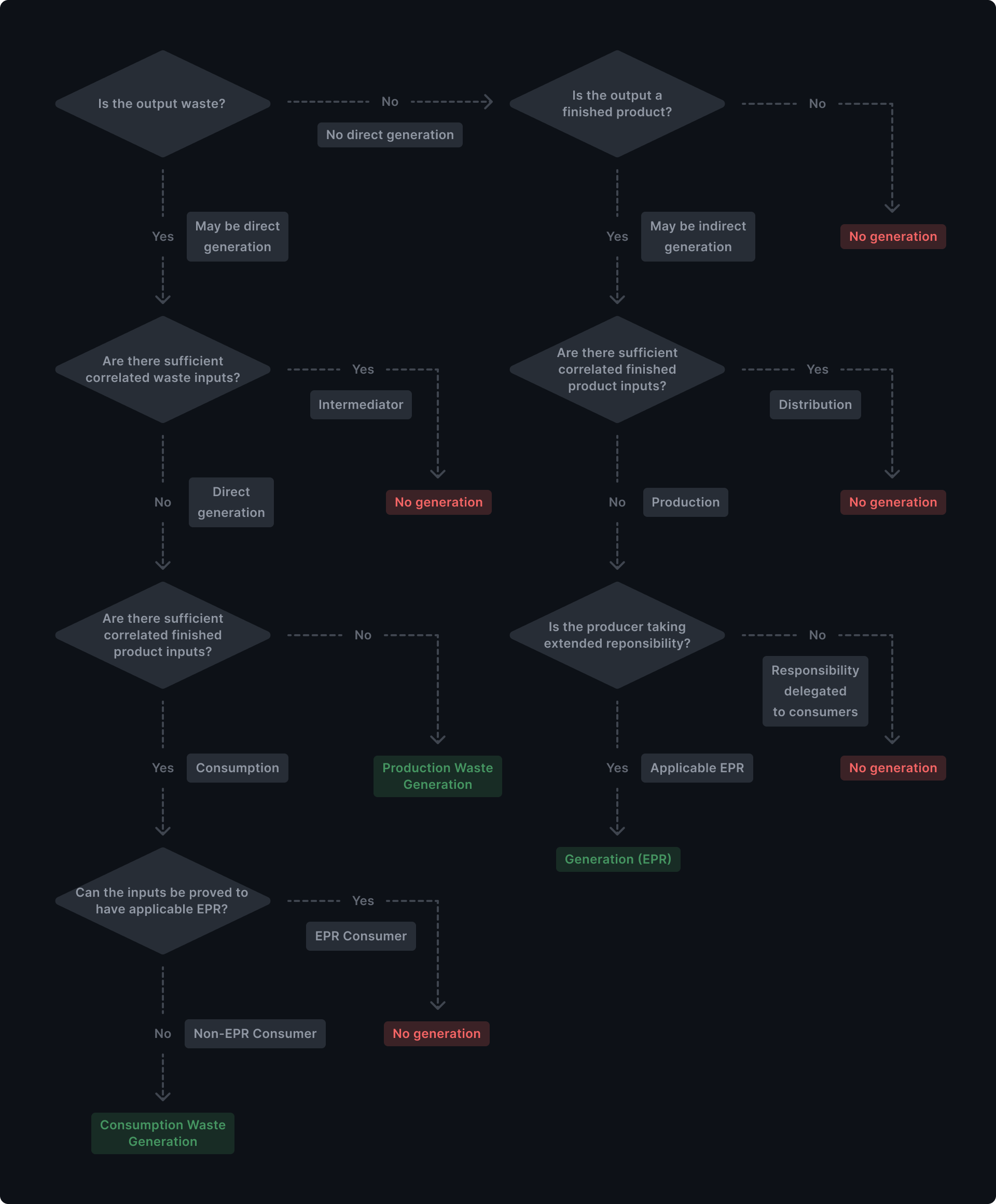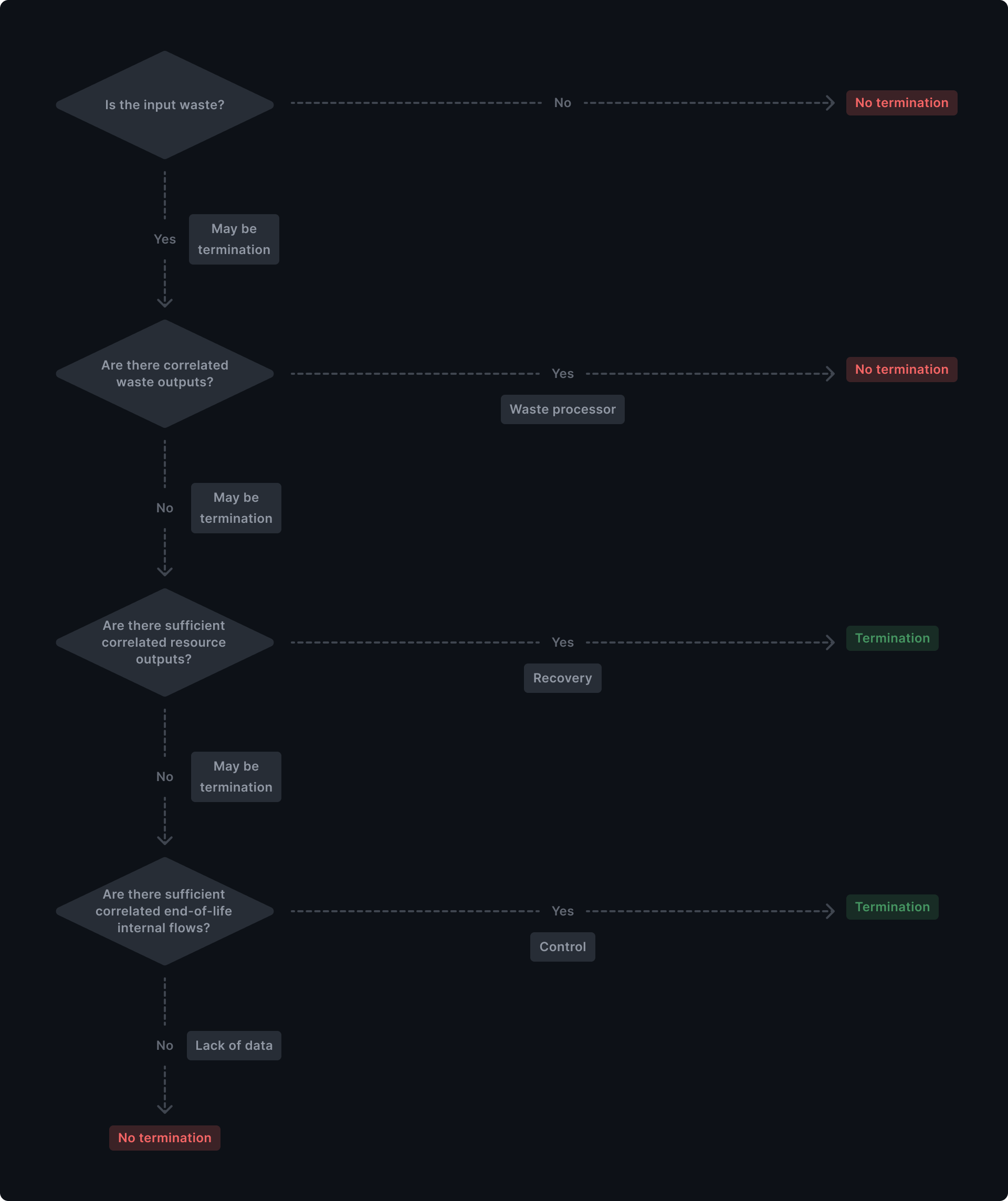Accountability Events Workflows
Material flows define the points at which responsibilities emerge and their corresponding fulfilling services are provided, in waste management and remediation. A precise understanding of the nature of such transactions is required for a correct assessment of responsibilities.
Generation Events
Generation events mark the transfer of newly created waste from the internal to the external system. This responsibility emerges based on the material flows and the application of Extended Producer Responsibility (EPR) guidelines.
| Generation | Production Waste | Consumption Waste | EPR Consumption Waste |
|---|---|---|---|
| Subject Definition | The first entity to insert waste materials to the external system, derived from intermediate products. | The first entity to insert waste materials to the external system, derived from finished products, which have no identified responsible producer. | The first entity to insert finished products to the external system, which have no identified responsible producer. |
| Material Flow Conditions | Waste Output → Applicable waste definition to outputs | Waste Output → Applicable waste definition to outputs | Finished Product Output → Applicable finished product definition to outputs |
| First Generation Node → No correlated waste inputs | First Consumer Node → Correlated finished products inputs | First Producer Node → No correlated finished products inputs | |
| Production Process → No correlated finished product inputs | Lack of Producer Claim → No identifiable claim by a producer over the input finished product | Applicable EPR → Applicable voluntary or regulatory framework to claim responsibility | |
| Accounting Time | At the moment in which the waste output happens | At the moment in which the waste output happens | At the moment in which the finished product output happens |
| Examples | A manufacturer generating scrap from raw materials in a production process. | A consumer purchasing a plastic product and discarding it after it has been used. | A brand producing a snack from inputs and selling it to distributors. |
The workflow to identify an event of waste generation can be summarized as follows:

Applying EPR Guidelines Consistently
While consumption waste can either be the responsibility of the producer or the consumer, it cannot be neither or simultaneously both. This clear demarcation ensures consistent accounting. A product claimed as a responsibility under EPR by its brand or producer exempts the consumer from responsibility of termination. Conversely, products not covered by EPR guidelines become a consumer's responsibility.
Termination Events
Termination events mark the end of the waste lifecycle, representing the point in which waste is effectively managed. These events are crucial in validating the definitive resolution of risks associated with waste. There are two distinctive cases of waste termination:
| Termination | Recovery | Control |
|---|---|---|
| Subject Definition | The first entity to mitigate waste-related risks to an acceptable level. | The first traceable entity to add value to waste to render it a tradable resource. |
| Material Flow Conditions | Waste Input → Applicable waste definition to inputs | Waste Input → Applicable waste definition to inputs |
| Last Node → No correlated waste outputs | Last Node → No correlated waste outputs | |
| Recovery Process → Correlated resource outputs | Risk Control Process → Correlated risk reduction internal transformations | |
| Accounting Time | At the moment in which the waste input happens | At the moment in which the internal transformation happens |
| Examples | An organization that collects residential waste, sorts its plastics, and sells them. | A waste treatment facility that neutralizes and disposes hazardous waste. |
The workflow to identify an event of waste termination can be summarized as follows:

Considerations of Recovery Processes
- Informal Waste Picking Traceability. The framework acknowledges the role of informal sectors in waste management. Termination is recognized at the first traceable entity, given the limitations of addressing the actual first entity in some cases. This ensures that waste management efforts are recognized as closely as possible to their point of origin and to their most vulnerable entities.
- Multiple Value Addition Steps. Entities purchasing resources derived from waste recovery can not claim responsibility for its termination, as they acquire materials that have been transformed into resources previously. This distinction is vital to avoid multi-counting of termination events at different stages of the same value chain.
- Recovery Type. Both types of recovery, either material or energetic, are valid as recovery processes as both add market value beyond the neutrality threshold. This includes direct commercialization of recovered resources or their related outputs like intermediate or finished products.
Leakage Events
Leakage events refer to the loss of operative control over waste, leading to its release into the environment or the uncontrolled system. This occurs when an entity fails to maintain control over waste and does not transfer control to another identifiable entity.
While the accountable entity is the one that loses control over the waste, extended responsibility can be applied to consumption waste leakage by producers to compensate for the failures of waste management systems where their products are discarded after their use. This mechanism, however, does not apply to production waste. This preemptive accounting of leakage is based on an assumption, a calculation deriving in a corresponding fraction of the total generation.
Capture Events
Capture events refer to the process by which an entity gains control of waste that is present in the uncontrolled system. This aspect of waste remediation is crucial as it addresses waste that has escaped controlled systems and entered the natural environment, validating the resolution of harm associated with its leakage. The subject of capture is the one that gains control over leaked waste.
Typical Mechanisms of Waste Capture
- Beach Clean-Up Initiatives. Environmental groups or local communities organizing clean-up events to remove litter and debris from coastal areas. These groups take responsibility for the waste once it is collected.
- River and Ocean Cleanup Operations. Specialized organizations deploying technology to capture waste from rivers and oceans. They assume responsibility for managing the waste they retrieve.
- Post-Disaster Waste Management. In the aftermath of natural disasters, specific agencies or organizations might take charge of clearing debris and managing the waste generated by the event.
- Volunteer Community Efforts. Local volunteer groups organizing to clean up public spaces like parks, trails, and urban areas. Upon collecting the waste, they are responsible for ensuring its proper disposal.